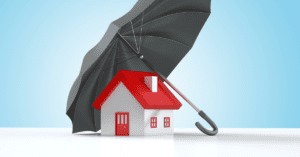Why Has My Home Insurance Gone Up? Unraveling the Mystery
Home insurance is a crucial safety net, protecting our most valuable asset from unforeseen events. However, many homeowners face an unexpected increase in their premiums. So, why has your home insurance gone up? This blog post will delve into the factors that lead to rising home insurance costs, offering insights and solutions to help you better understand and manage these changes.
Understanding the Basics of Home Insurance
What is Home Insurance?
Home insurance, also referred to as homeowner’s insurance, is a kind of property insurance that protects a person’s home and possessions against losses and damages. Furthermore, it offers liability protection against mishaps on the land or within the residence. Protecting homeowners from financial loss in the case of damage or destruction due to particular risks is the primary goal of home insurance. These typically include fire, theft, vandalism, and natural disasters such as hurricanes and earthquakes.
Components of a Home Insurance Policy
Home insurance policies generally comprise several types of coverage:
- You can insure your home’s structure with dwelling coverage.
- Your possessions are protected with personal property coverage.
- Legal expenses are covered by liability protection if someone gets hurt on your land.
- Additional living expenses (ALE) cover living away from home if it becomes uninhabitable.
Understanding these components is crucial because each significantly impacts how much your home insurance will cost. Therefore, any change in these factors can increase your premiums.

The Role of Risk Assessment in Home Insurance
How Insurers Evaluate Risk
Insurance companies use various factors to assess the risk of insuring a home. They evaluate the possibility of filing a claim and its possible expense. This risk assessment directly impacts your home insurance premiums. Factors such as the location of your home, its age, construction type, and credit history can influence risk assessments. For instance, houses in high-risk locations frequently experience natural disasters.
Why Risk Assessment Affects Premiums
As risk increases, so do insurance premiums. Insurance companies need to ensure they have enough funds to cover potential claims. If your home is more likely to suffer damage or you are more likely to file a claim, your insurance costs will reflect this increased risk. Understanding the role of risk assessment in determining your home insurance premiums can help you identify potential areas for cost savings. By mitigating risks, you can reduce your insurance costs.
The Impact of Natural Disasters on Home Insurance
Increasing Frequency of Natural Disasters
In recent years, the frequency and severity of natural disasters have risen significantly. Events like hurricanes, wildfires, floods, and earthquakes have become more common, increasing home insurance claims. To consider these changes, insurance companies had to modify their risk models. Resulting in higher premiums for homeowners. For those living in high-risk areas, the increase can be substantial.
How Natural Disasters Drive Up Costs
When natural disasters occur, insurance companies face a surge in claims. To cover these costs, they often raise premiums across the board. This means even if you haven’t filed a claim, you might still see an increase in your home insurance costs. Furthermore, After a disaster, the cost of rebuilding may increase because of increased labor and material demands. This, in turn, pushes up insurance costs as companies anticipate higher future claims.
The Influence of Home Renovations on Insurance Costs
Renovations and Their Impact on Coverage
Home renovations can significantly impact your insurance premiums. While updating your home can increase its value, it can also introduce new risks or require additional coverage. For example, adding a swimming pool or an extension can increase liability risks, leading to higher premiums. Similarly, upgrading your kitchen with high-end appliances might require additional coverage for personal property.
Keeping Insurers Informed
Notifying your insurance company of any significant renovations is imperative. Failing to update your policy could leave you underinsured in the event of a claim. Moreover, some improvements, like installing a new roof or security system, qualify you for discounts. By maintaining open communication with your insurer, you can ensure your policy accurately reflects your home’s current value and risk profile, potentially mitigating any premium increases.
The Effect of Market Conditions on Home Insurance
Economic Factors at Play
Market conditions can also influence home insurance premiums. Economic factors such as inflation, interest rates, and the economy’s overall health play a role in determining insurance costs. As inflation rises, so do the costs of building materials and labor. Consequently, insurance companies must adjust premiums to reflect these increased costs. Moreover, variations in interest rates may affect the investment income that insurers rely on, which could lead to higher premiums.
Competitive Market Dynamics
The insurance market is highly competitive, and companies constantly adjust their pricing strategies to attract and retain customers. Sometimes, market competition can lead to lower premiums. However, if an insurer experiences financial difficulties or increased claims, they might raise rates. Understanding market dynamics can help you identify when shopping around for a better rate, which might be beneficial. By comparing policies and companies, you may find more competitive options.
The Significance of Claims History in Premium Calculation
How Claims History Affects Your Premiums
Your claims history is a critical factor in determining your home insurance premiums. If you’ve filed multiple claims in the past, Your costs may go up if insurers think you pose a more significant risk. Insurance companies use claims history to predict future behavior. Therefore, a history of frequent claims can result in higher premiums. Conversely, maintaining a claim-free record might qualify you for discounts or lower rates.

Strategies for Managing Claims
To keep your insurance costs down, consider managing minor repairs independently rather than filing a claim. This can help maintain a clean claims record. Regular maintenance and proactive risk management can also prevent issues that might lead to claims. Investing in preventive measures can reduce the likelihood of needing to file an insurance claim.
Understanding Policy Changes and Their Impact
Adjustments in Coverage Terms
Insurance companies periodically review and adjust policy terms to reflect changing risks and market conditions. These adjustments can impact your premiums. For instance, an insurer might introduce new exclusions or alter coverage limits. These changes can lead to increased costs if you need to purchase additional coverage to maintain the same level of protection.
The Importance of Reviewing Your Policy
It is crucial to routinely review your house insurance policy to prevent unpleasant surprises. Making educated selections regarding your insurance requirements might be aided by your understanding of terms and coverage modifications. By staying informed and proactive, you can identify opportunities for cost savings or adjustments that align with your current circumstances.
Tips for Managing Rising Home Insurance Costs
Shopping Around for Better Rates
One of the most effective ways to manage rising insurance costs is to shop around for better rates. Insurance companies offer varying pricing and coverage options; hence, comparing quotations will enable you to get the best offer. When comparing policies, consider each insurer’s cost, coverage, and customer service reputation. You can manage your insurance costs effectively by finding a policy that meets your needs at a competitive price.
Exploring Discounts and Bundling Options
Several insurance providers provide discounts for various reasons, such as installing security systems, being claim-free, or bundling multiple policies together. Ask your insurer about discounts and consider bundling your insurance with other policies, such as auto insurance, to take advantage of potential savings. Bundling can simplify your insurance management while potentially reducing costs.
Conclusion: Staying Informed and Proactive
Understanding why your insurance has increased is essential for managing your expenses effectively. You can better control your insurance costs by staying informed about the factors influencing your premiums and taking proactive steps to mitigate risks. As the insurance landscape evolves, maintaining open communication with your insurer and regularly reviewing your policy can support you in making decisions regarding your coverage and helping you adjust to changes. With the right approach, you can protect your home while managing your insurance expenses efficiently.

